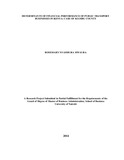| dc.description.abstract | This report evaluates the determinants of financial performance of public transport
business in Kenya, a case of Kiambu County. The report mainly focuses on matatus. The
objective of this report is to evaluate the determinants of financial performance in public
transport business in Kenya a case of Kiambu County. The study was conducted on
selected owners of matatu businesses through questionnaires. Population of the study was
Matatus plying the Kiambu Nairobi route. According to the Ministry of Infrastructure,
there are seven registered Societies on Kiambu-Nairobi route with a total of 116
members. The targeted population therefore comprised of 116 investors in public
transport business. The study used simple random sampling to select a sample of 56
investors from the population. Data was collected by use of questionnaires. The data
collected was analyzed through use of SPSS software and the resulted interpreted.
Regression analysis was used to establish the influence of SACCOs, Operatives culture
and Government influence on financial performance at 0.05 level of significance. The
findings presented also show that taking all other independent variables at zero, a unit
increase in Influence of SACCOs lead to a 0.891 increase determining financial
performance of public transport business in Kiambu County; a unit increase in operatives
culture would lead to a 0.813 increase in determining financial performance of public
transport business in Kiambu County; and a unit increase in government influence would
lead to a 0.857 increase in determining financial performance of public transport
business in Kiambu County. At 0.05% level of significance and 95% level of confidence,
Influence of SACCOs had a 0.0209 level of significance; operatives culture showed a
0.0217 level of significance; investment deduction showed a 0.0224 level of significance
while government influence showed a 0.0236 level of significance. Most matatu
businesses are owner/self managed and that matatu businesses perform better when they
are self/owner managed. Research findings conclude a relationship between both overall
and operating strategies and the nature and level of regulatory compliance. The study also
found that TLB taxes are deemed to be high as implemented on matatu businesses while
county government taxes, levies, parking fees and other charges were seen to be fair by
the matatu businesses. According to the findings on training and seminars, it was found
that there is very little training as organized by the Saccos and that the little that is being
done does not have an impact n the financial performance on the matatu businesses which
is of importance for the sustenance of the businesses. It also found that compliance was
selective, with operators following regulations deemed to be reasonable and possible. The
findings conclude that compliance may be enhanced by promoting cooperation between
Matatu owners and government in streamlining regulations and ensuring fair and
consistent enforcement, as well as by recognizing that Matatus are legitimate transport
businesses rendering a public service. | en_US |

